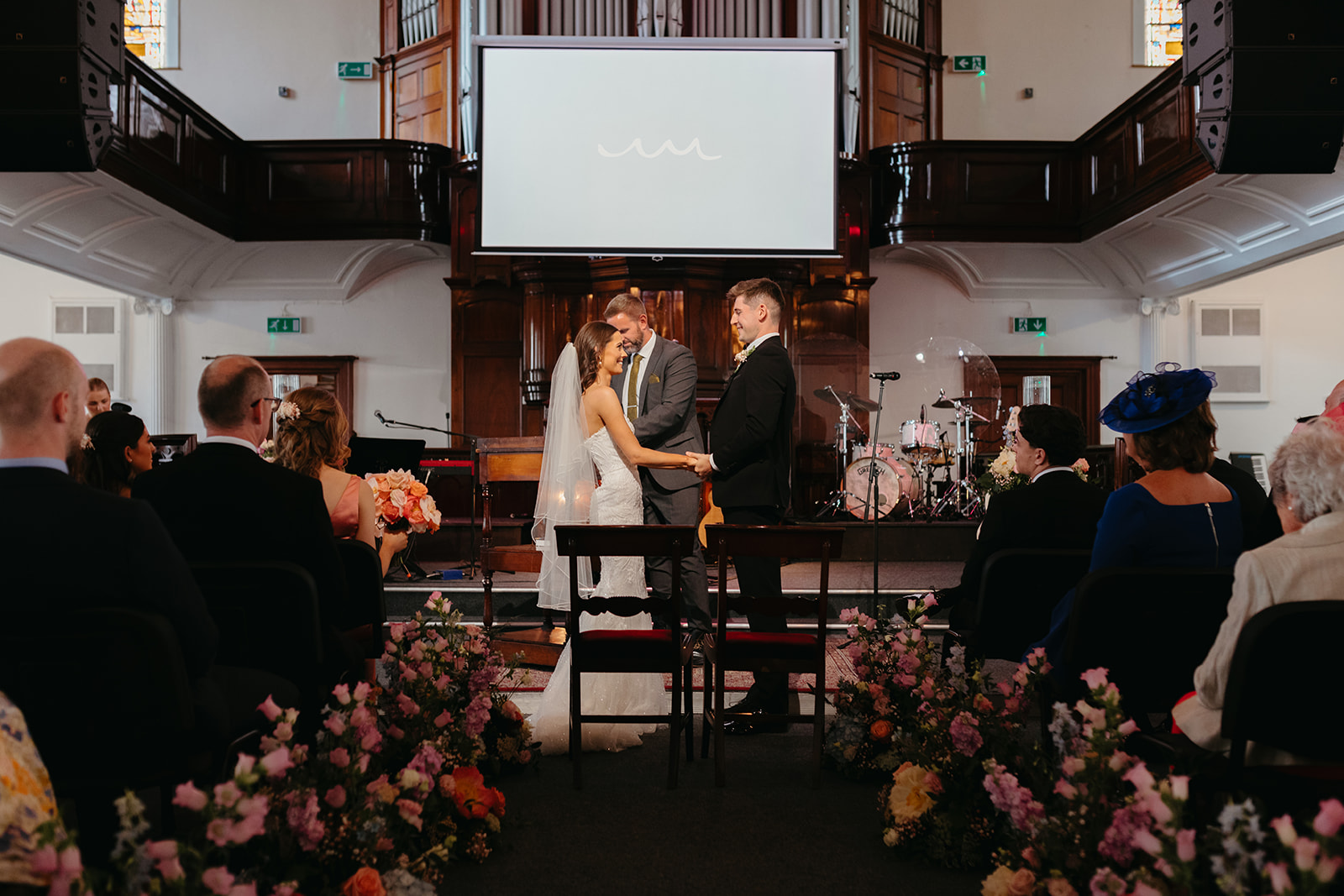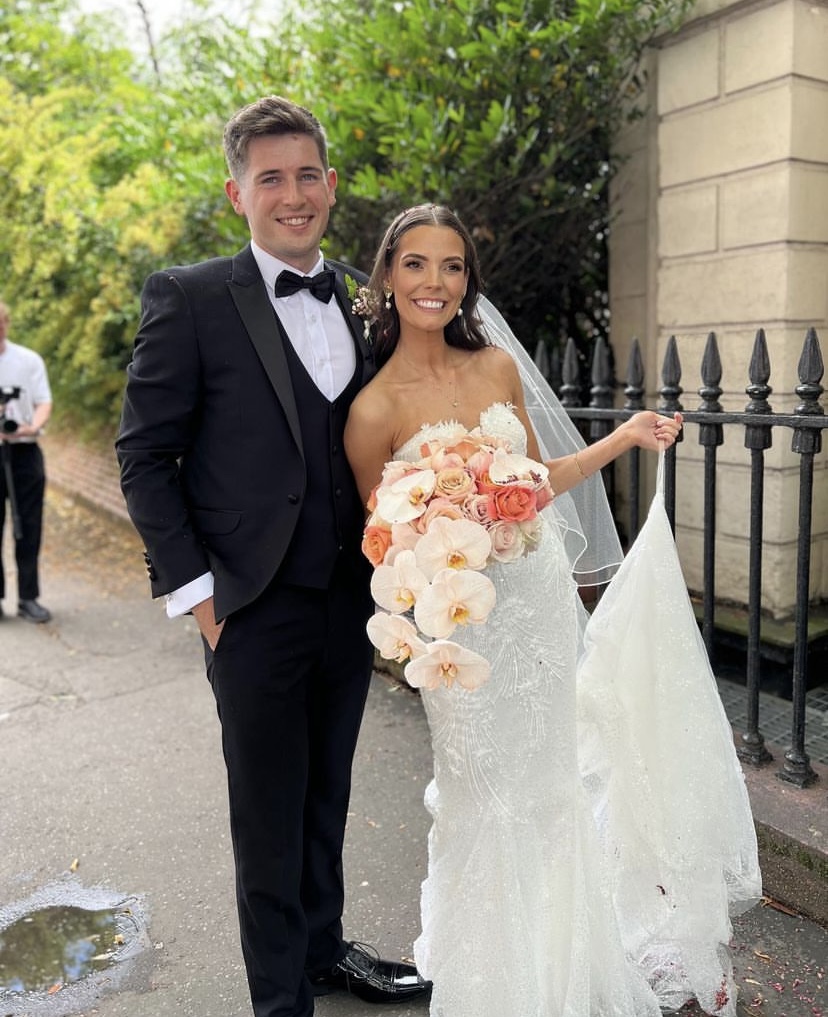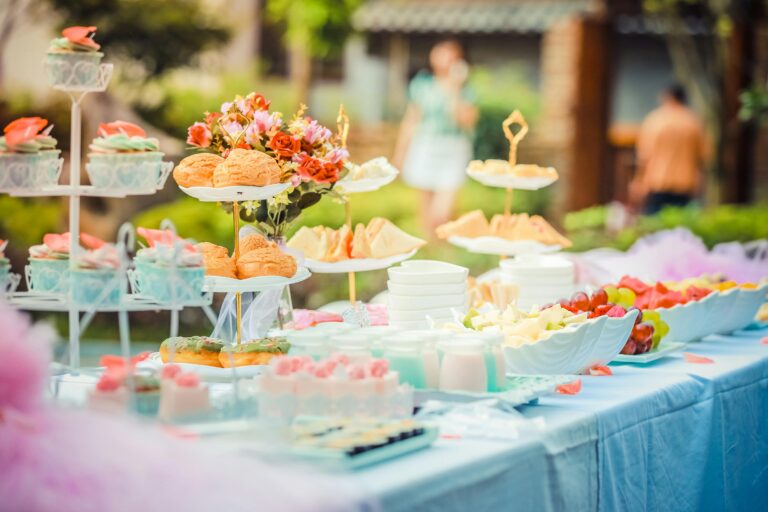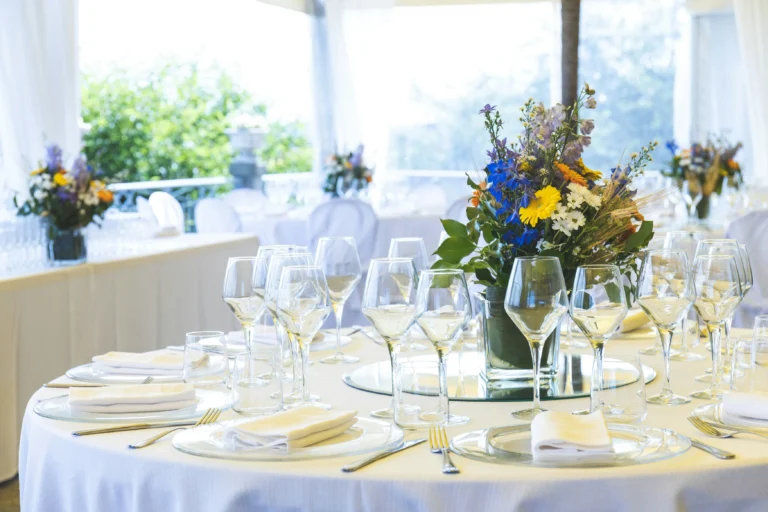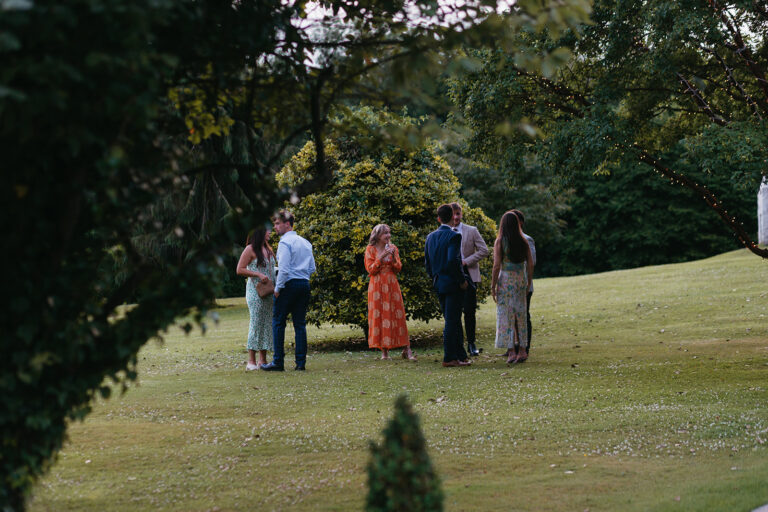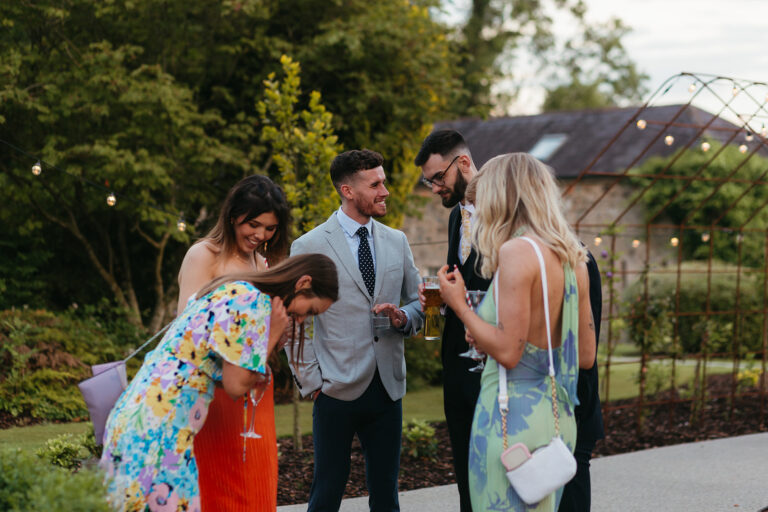How long is a wedding ceremony and FAQs
Hello lovebirds! ❤️
I remember that moment when Callum and I were planning our big day, and we found ourselves wondering, “Just how long is this ceremony going to take?” It’s one of those details that you might not think about at first, but it quickly becomes crucial when you start planning everything from hair appointments to dinner.
We have put together a detailed guide the most frequently asked questions about the wedding ceremony below ⛪
How long is a wedding ceremony?
On average, a wedding ceremony lasts about 30 to 45 minutes, but this can vary widely. Some ceremonies are as brief as 10 minutes, while others, particularly those with religious or cultural elements, can stretch up to an hour or more. The length of your ceremony will depend on factors like the type of ceremony, the traditions you want to include, and even your personal preferences.
For example, traditional church ceremonies tend to be longer because they might include readings, hymns, and other rituals. In contrast, a civil ceremony or a quick elopement might be over before you know it!
In the UK, church weddings often last around 45 minutes to an hour, depending on how much you pack in.
If you’re trying to figure out what to expect or how to plan, here’s a quick comparison:
- Civil ceremonies: Typically 15 to 30 minutes.
- Religious ceremonies: Usually 30 minutes to 1 hour.
- Non-traditional ceremonies: Can be as short or as long as you like.
Understanding how long your wedding ceremony will last is key to ensuring everything else on your big day runs smoothly. So let’s dive into the specifics, starting with church weddings.

How long is a church wedding ceremony and what is the order?
If you’re opting for a church wedding, particularly here in the UK, you’re probably looking at a ceremony that lasts between 45 minutes to an hour. But what fills all that time?
Church ceremonies often include several elements that add to the overall length:
- The Procession: This is where it all begins! The time it takes for everyone to walk down the aisle can add a few minutes, especially if you have a large bridal party.
- Readings and Hymns: Expect a few carefully chosen passages from the Bible and some beautiful hymns. These moments are meaningful but do extend the ceremony.
- Vows and Exchange of Rings: The heart of the ceremony, where you make your promises to each other. Depending on whether you write your own vows or stick to the traditional ones, this can take anywhere from 5 to 15 minutes.
- Signing of the Register: The couple will then go and sign their marriage certificate with their witnesses. Normally in this time the worship leader(s) will sing a few songs to entertain the congregation.
- The Address: This is where the pastor/vicar will deliver a short lesson to the newly married couple and their congregation. This normally lasts about 10-15 minutes.
- The Recessional: The joyful march out of the church is usually quicker but no less important!
What to wear to a church wedding ceremony?
For Women:
- Dress Length: Opt for knee-length or longer gowns for a formal yet appropriate look.
- Shoulder Coverage: Consider wearing a shawl, jacket, or bolero to cover your shoulders during the ceremony.
- Color Choices: Bright colors are fine, but avoid anything too flashy or revealing.
- Fabric Selection: Lace, silk, or other sophisticated fabrics add a touch of class.
- Footwear: Choose comfortable yet elegant heels or dressy flats.
For Men:
- Suit Style: A dark suit with a tie is a safe choice, but for more traditional weddings, consider a morning suit with a waistcoat and cravat.
- Footwear: Polished shoes are a must to complement your outfit.
- Accessories: A neat pocket square adds a stylish touch.
Accessories and Extras:
- Hats: Women might consider wearing a hat, especially if the wedding is formal or held in the UK.
- Bags: Opt for a small, elegant clutch that matches your outfit.
- General Tip: Ensure your outfit respects the formal and sacred nature of the church while still allowing you to express your personal style.
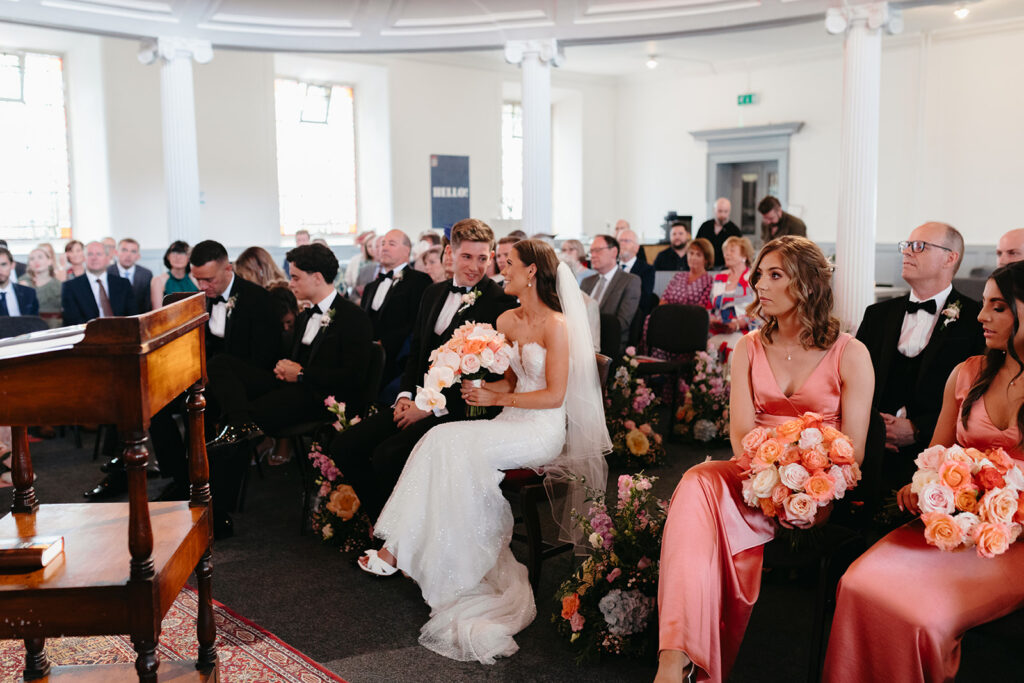
Who sits where at a wedding ceremony?
Some couples choose to be traditional with their seating plan, with two clear sides the seating: brides family and friends on one side, with the grooms family and friends on the other.
We personally went for a mix of tradition and modern where we asked our family to sit on preferred sides, but said that any other guests and friends could sit wherever they wanted, meaning we had a nice mix as we looked back at the congregation.
- Bridesmaids and Groomsmen: Typically, bridesmaids sit on the bride’s side, and groomsmen on the groom’s side, flanking the altar. In the UK, that means bridesmaids to the left and groomsmen to the right as you face the altar.
- Best Man: The best man usually stands next to the groom during the ceremony, then sits in the front row afterward.
- Parents: The parents of the bride and groom traditionally sit in the first row. In cases of blended families, consider seating arrangements that honor all parties without creating tension.
- Ushers: Typically, they sit in the back row or near the aisle for easy access.
What songs and how many songs do you need for a wedding ceremony?
Music sets the mood, right? Whether it’s the romantic notes of the processional, meaningful hymns or an upbeat tune as you walk back down the aisle together, choosing the right songs is key.
So, how many songs should you have? Generally, 4 to 6 songs cover the main parts of the ceremony:
- Processional: 1 or 2 songs, depending on the size of the bridal party.
- Hymns: 2 or 3 hymns during the service.
- Signing of the Register: 1 song.
- Recessional: 1 upbeat song to end the ceremony on a high note.
Need some inspiration? Here is a list of the top 10 wedding hymns as provided by Hitched:
1. Abide With Me – William Henry Monk
2. All Creatures of Our God and King – William Henry Draper
3. All Things Bright And Beautiful – Cecil Frances Alexander
4. Amazing Grace – John Newton
5. And Can It Be (Amazing Love) – Charles Wesley
6. Be Still For The Presence Of the Lord – David J. Evans
7. Be Thou My Vision – Eleanor H. Hull
8. Bind Us Together – Bob Gillman
9. Dear Lord And Father Of Mankind – John Greenleaf Whittier
10. Fill Your Hearts With Joy and Gladness – Timothy Dudley Smith
Callum’s top tip: “If you cannot decide on wedding ceremony songs – create a playlist of your favorite tunes 6 months before, and choose your favorites from it over time!”
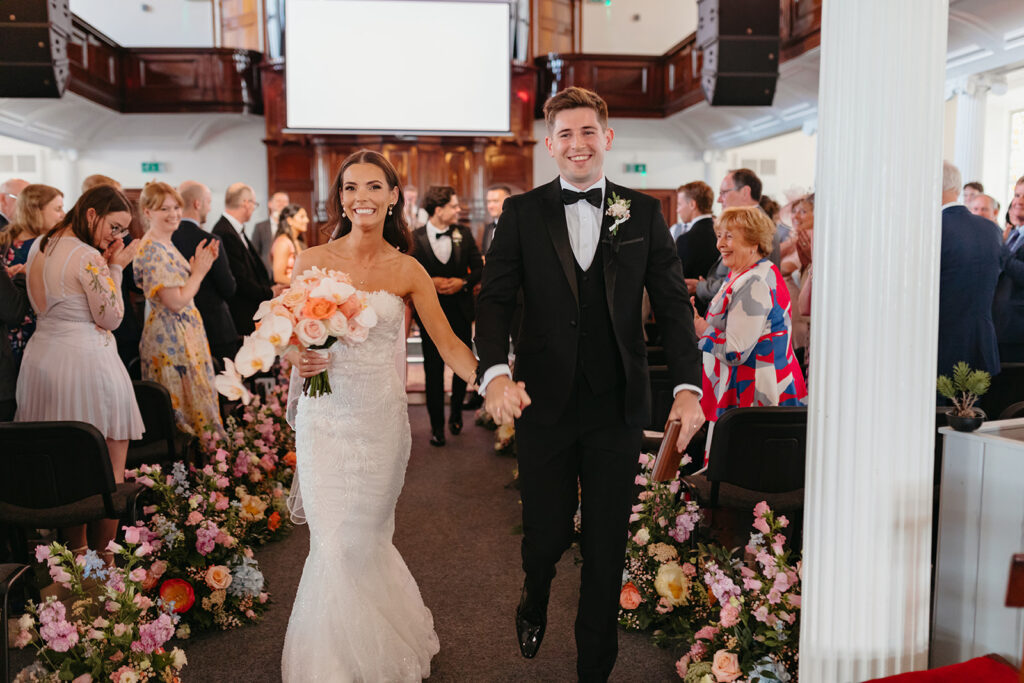
How to involve family in a wedding ceremony?
Let’s face it, weddings can be a bit long for the littlest guests. How do you keep a toddler entertained during a wedding ceremony? You don’t want a meltdown in the middle of your vows, so a bit of pre-planning goes a long way.
Here’s a trick: Small activity packs with coloring books, crayons, and maybe a snack can work wonders. For older kids, consider giving them roles like handing out programs or being junior ushers. Involving nieces, nephews, and other children in the ceremony can make them feel special and keep them engaged.
- Flower girls and ring bearers are classic roles that children love.
- Family Involvement: Have your relatives do readings, light candles, or even sing a song. It’s a great way to make them feel included without adding too much length to the ceremony.
What time should a wedding ceremony start and guests arrive?
It depends on your overall schedule. A good rule of thumb is to plan the ceremony to end about 1 to 2 hours before the reception starts. This gives you time for photos, mingling, and perhaps a cocktail or two.
- When should guests arrive? Aim for at least 15 to 30 minutes before the ceremony starts. You don’t want anyone sneaking in as you’re halfway through your vows!
- Ending the Ceremony: This is where you can really make a statement—whether it’s with a confetti shower, a live band, or even a surprise performance.
Keeping everything on time requires a bit of coordination, but it’s worth it to keep the day flowing smoothly.
More Wedding Ceremony FAQs
How much does a wedding ceremony cost?
The cost can vary widely based on location, officiant fees, and any extras like musicians or special décor. In the UK, expect to spend anywhere from £200 to £2,000 depending on the venue and your choices.
What’s the difference between a wedding and a civil ceremony?
A civil ceremony is legally binding but non-religious, often shorter and more flexible than a traditional wedding.
How to decorate an outdoor wedding ceremony?
If you’re saying “I do” under the open sky, think about weatherproof decorations and seating. Consider a tent or marquee as a backup, and plan for little touches like hand fans or blankets, depending on the season.
Conclusion
The wedding ceremony is arguably the most important part of your big day – take time to carefully consider each element of it, make it personal to you, and enjoy every moment!
Grab a look at out All In One Wedding Planner Spreadsheet to help you on your wedding planning journey – it saved us so much time and effort having everything in one place!
Also read more of our helpful wedding guides like How much do wedding flowers cost and How much cake do you need for your wedding.
Happy planning ❤️

